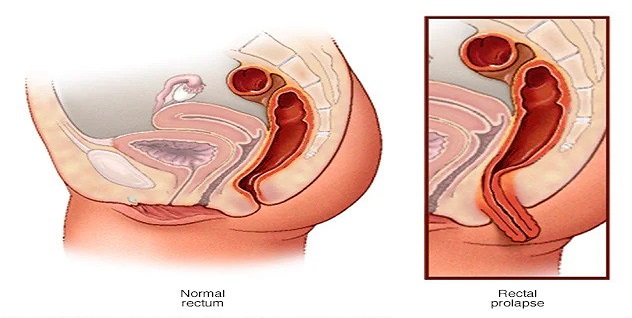
Rectal prolapse
Rectal prolapse occurs when part of the large intestine's lowest section (rectum) slips outside the muscular opening at the end of the digestive tract (anus). While rectal prolapse may cause discomfort, it's rarely a medical emergency. Rectal prolapse can sometimes be treated with stool softeners, suppositories and other medications. But surgery is usually needed to treat rectal prolapse.
Symptoms
If you have rectal prolapse, you may notice a reddish mass that comes out of the anus, often while straining during a bowel movement. The mass may slip back inside the anus, or it may remain visible.
Other symptoms may include:
- The inability to control bowel movements (fecal incontinence)
- Constipation or diarrhea
- Leaking blood or mucus from the rectum
- Feeling that your rectum isn't empty after a bowel movement
Causes
The cause for rectal prolapse is unclear. Though it's a common assumption that rectal prolapse is associated with childbirth, about one-third of women with the condition have never had children.
Diagnosis
To confirm the diagnosis or rule out other possible problems, they might use one or several of the following tests:
- Digital Rectal Exam. This is a physical exam using lubricated gloved fingers.
- Defecography. This is an imaging study of your muscles when you poop, using an X-ray or MRI.
- Anorectal Manometry. This test measures the strength and tightness of your anal sphincters.
- Lower GI Series (barium enema). A series of video X-rays of your lower gastrointestinal tract.
- Colonoscopy. This test examines the inside of your large intestine with a flexible scope.
- Electromyography (EMG): This test determines if nerve damage is the reason why the anal sphincters are not working properly. It also examines muscle coordination.
Treatment
Two out of the traditional eight branches of ayurvedic medicines take care of surgery which is generally called Śalya-cikitsā and Śālākya-tantra, but present day Ayurvedic treatment is inclined towards attaining good health with the help of developing a strong and healthy metabolic body and sustaining well with a good digestive and excretory system. This form of medical science also focuses on meditation, yoga and exercise.
- Changeri ghrita- useful in bloating, malabsorption syndrome, diarrhoea, dysuria, piles.
- Mushika Taila- This oil is applied to the prolapsed part, it is placed in its normal position and bandaging is done.
- Triphala Choorna- Useful in wound healing, has astringent effect.
- Lodhrasava-Useful in piles, anaemia, heavy bleeding.
- Ashokarisata-Useful in pain menstruation, heavy periods, fever, bleeding disorders such as nasal
- bledding, bleeding haemorrhoida, inflammation.
- Kutajarishta- Useful in fever, sprue, diarrhoea etc.
- Bola parpati- Useful in bleeding disorders, bledding haemorrhoids.
- Aravindasava- Useful in children, to improve digestion and muscle strength.
- Chandanasava- Useful in improving blood circulation.
- Manibhadra Guda- Useful in piles, intestinal worms, cough.
